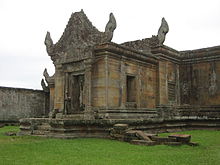This article needs additional citations for verification. (March 2024) |
| Preah Vihear Temple | |
|---|---|
Prasat Preah Vihear | |
 Preah Vihear temple | |
| Religion | |
| Affiliation | Hinduism |
| Deity | Shiva |
| Festivals | Shrine |
| Location | |
| Location | On top of Preah Vihear mountain, Dangrek mountain range |
| Country | Choam Khsant, Preah Vihear, Cambodia |
| Geographic coordinates | 14°23′26″N 104°40′49″E / 14.39056°N 104.68028°E |
| Architecture | |
| Creator | Suryavarman I and Suryavarman II |
| Completed | 11th–12th centuries AD |
| Inscriptions | K.383 K.380 K.381 K.382 |
| Elevation | 525 m (1,722 ft) |
| Website | |
| preahvihearauthority | |
| Official name | Temple of Preah Vihear |
| Criteria | Cultural: (i) |
| Reference | 1224rev |
| Inscription | 2008 (32nd Session) |
| Area | 154.7 ha (382 acres) |
| Buffer zone | 2,642.5 ha (6,530 acres) |
Preah Vihear Temple (Khmer: ប្រាសាទព្រះវិហារ Prasat Preah Vihear; Thai: ปราสาทพระวิหาร; RTGS: Prasat Phra Wihan) is an ancient Hindu temple built by the Khmer Empire, located on top of a 525-metre (1,722 ft) cliff in the Dângrêk Mountains, in the Preah Vihear province of Cambodia.
As a key edifice of the empire's spiritual life, Preah Vihear Temple was supported and modified by successive kings and thus bears elements of several architectural styles. It is unusual among Khmer temples in being constructed along a long north–south axis, rather than having the conventional rectangular plan with orientation toward the east. The temple gives its name to Cambodia's Preah Vihear province in which it is now located, as well as the Khao Phra Wihan National Park, which borders it in Thailand's Sisaket province, though it is no longer accessible from Thailand.
In 1962, after a lengthy dispute between Cambodia and Thailand over ownership, the International Court of Justice in the Hague ruled that the temple is in Cambodia.[1] On 7 July 2008, Preah Vihear was listed as a UNESCO World Heritage Site.[2][3] This prompted an escalation in the dispute between Cambodia and Thailand over the temple, which was settled in favour of Cambodia by another ICJ ruling in 2011.
- ^ "Geography: Cambodia". 14 November 2022. Archived from the original on 10 June 2021. Retrieved 24 January 2021.
- ^ "900-year-old temple on disputed Thai-Cambodia border named world heritage site". International Herald Tribune. La Défense, France. The Associated Press. 8 July 2008. Archived from the original on 10 February 2009. Retrieved 16 November 2013.
- ^ Buncombe, Andrew (9 July 2008). "Thai anger as disputed Cambodian temple wins heritage status". The Independent. London, UK. Archived from the original on 31 July 2008. Retrieved 16 November 2013.
